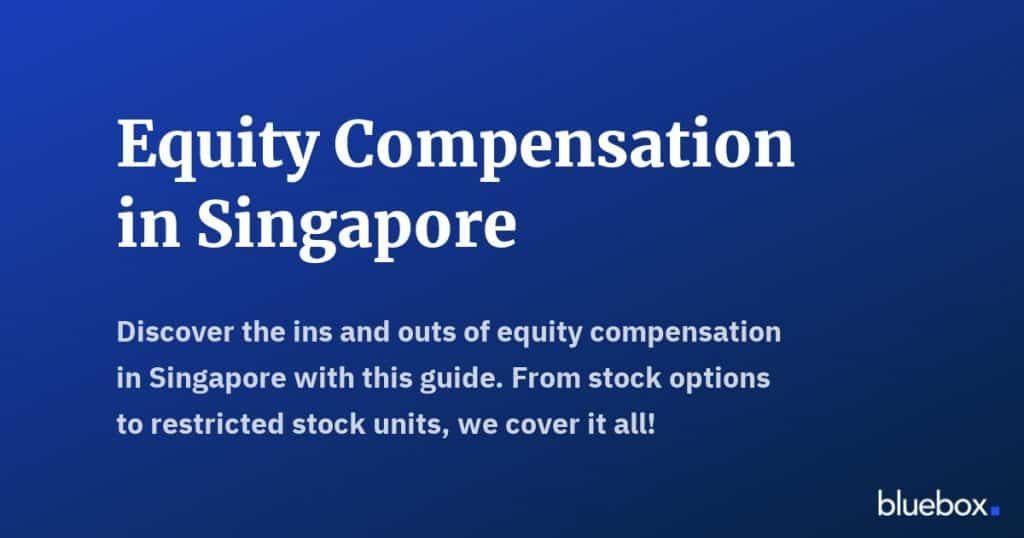Equity compensation is a powerful tool for startups and small businesses in Singapore to attract, retain, and reward top talent. But with various structures available, such as stock options, RSUs, and ESOPs, it can be challenging for founders and employees to understand their implications. In this article, we’ll break down the basics of each equity compensation type and discuss their benefits, drawbacks, and tax implications in the context of Singapore.
Stock Options: A Popular Choice for Startups
What are Stock Options?
Stock options grant employees the right to buy a specified number of company shares at a predetermined price (called the “exercise price”) within a certain period. They’re a popular choice among startups because they don’t require any cash outlay upfront, and their value is directly tied to the company’s growth and success.
Pros and Cons for Founders and Employees
For founders:
- Stock options align employees’ interests with the company’s growth, motivating them to contribute their best efforts.
- They can be an attractive perk for potential hires, especially in a competitive market like Singapore.
For employees:
- Stock options offer an opportunity to share in the company’s success and potentially earn significant returns if the company performs well.
- They provide a sense of ownership and commitment to the company.
However, stock options also come with some drawbacks:
- If the company’s stock price doesn’t rise above the exercise price, the options may become worthless.
- The process of exercising options and selling shares can be complex and time-consuming, especially for employees who are unfamiliar with financial markets.
Tax Implications and Vesting Schedules in Singapore
In Singapore, stock options are generally taxed when they’re exercised, based on the difference between the exercise price and the market value of the shares. However, some exceptions and tax relief programs may apply, such as the Qualified Employee Equity-Based Remuneration (QEEBR) scheme. It’s essential for both employers and employees to consult with a tax professional to understand their specific tax obligations.
Stock options typically come with a vesting schedule, which determines when employees can exercise their options. A common vesting schedule in Singapore is a four-year period with a one-year cliff, meaning that employees must remain with the company for at least one year before any options vest, and the remaining options vest monthly over the next three years.
Restricted Stock Units (RSUs): A Simpler Alternative
What are RSUs?
Restricted Stock Units (RSUs) represent a promise to grant employees a specified number of company shares after meeting certain conditions, such as a vesting period or performance milestones. Unlike stock options, RSUs don’t require employees to pay an exercise price, making them a simpler form of equity compensation.
Pros and Cons for Founders and Employees
For founders:
- RSUs are easier to understand and administer than stock options, potentially reducing administrative burdens and confusion among employees.
- They can be more attractive to employees who value simplicity and certainty over the potential upside of stock options.
For employees:
- RSUs provide a guaranteed benefit, as employees don’t have to worry about the stock price rising above an exercise price.
- They offer a more straightforward path to ownership, as employees automatically receive shares once the vesting conditions are met.
However, RSUs also have some drawbacks:
- They’re less flexible than stock options, as employees can’t choose when to exercise them based on market conditions.
- RSUs may be less motivating for employees who prefer the potential for significant gains offered by stock options.
Tax Implications and Vesting Schedules in Singapore
In Singapore, RSUs are generally taxed when they vest, based on the market value of the shares at that time. As with stock options, it’s important for employers and employees to consult a tax professional to understand their specific tax obligations.
RSUs also come with a vesting schedule, which can be similar to stock options or tied to performance milestones. The specific terms will depend on the company’s goals and employee agreements.
Employee Stock Ownership Plans (ESOPs): Broad-Based Equity Incentives
What are ESOPs?
Employee Stock Ownership Plans (ESOPs) are broad-based equity incentive programs that allow employees to acquire company shares through a trust. ESOPs are relatively rare in Singapore compared to stock options and RSUs, but they can provide unique benefits for both founders and employees.
Pros and Cons for Founders and Employees
For founders:
- ESOPs can help create a strong sense of ownership and loyalty among employees, potentially reducing turnover and fostering a more engaged workforce.
- They can serve as a long-term retirement benefit for employees, aligning with Singapore’s emphasis on financial security and retirement planning.
For employees:
- ESOPs provide a long-term investment opportunity and potential source of retirement income.
- They offer a sense of shared ownership and commitment to the company’s success.
However, ESOPs also come with some challenges:
- They can be more complex and costly to set up and administer than stock options or RSUs.
- ESOPs may be less appealing to employees who prefer more immediate equity incentives, such as stock options or RSUs.
Tax Implications and Vesting Schedules in Singapore
ESOPs are generally taxed when employees receive distributions from the trust, which can be in the form of cash or company shares. As with other equity compensation structures, it’s crucial for employers and employees to consult a tax professional to understand their specific tax obligations.
Vesting schedules for ESOPs can vary widely, depending on the company’s goals and employee agreements. In some cases, vesting may be tied to years of service, performance milestones, or a combination of factors.
Conclusion
Equity compensation is a valuable tool for startups and small businesses in Singapore, offering a range of structures to suit different goals and circumstances. Stock options, RSUs, and ESOPs each have their unique benefits and drawbacks for founders and employees, as well as varying tax implications and vesting schedules. By understanding these nuances and incorporating expert opinions, companies can make informed decisions about which equity compensation structure best fits their needs.
